The Dopamine Delusion
Why Anticipation Beats Achievement

The Dopamine Delusion
Why Is Anticipation More Rewarding Than Achievement?
We build our lives around goals, purchases, and achievements that, while meaningful, may never match the excitement we felt leading up to them.
Welcome to the dopamine delusion!
This cycle plays out in everyday life:
- Planning a vacation often feels more exciting than being on it.
- Waiting for a text creates more mental stimulation than reading it.
- Online shopping is driven by browsing and adding to cart, not the final purchase.
- Scrolling social media creates endless micro-hits of anticipatory reward, rarely delivering lasting satisfaction.
The more we have, the more we want. The more things we acquire and the easier things get for us, the more discontent we feel.
The more spoiled we become as a society with technology and our easy first world lifestyles, the more we complain. To paraphrase the U2 song, we still haven't found what we're looking for.
In the course of my business career I have met and worked with some very successful wealthy business people and for the majority of them the money is never enough, they are always seeking ways of making more money. It's a race with no finish line.
For the most part, they are like John D. Rockefeller who when asked: "How much money is enough money?" Allegedly answered: “just a little bit more.”
So, in an age where we are constantly chasing the next goal, craving the next hit of excitement, or awaiting the next notification, it’s easy to believe that the joy of life lies in achieving.
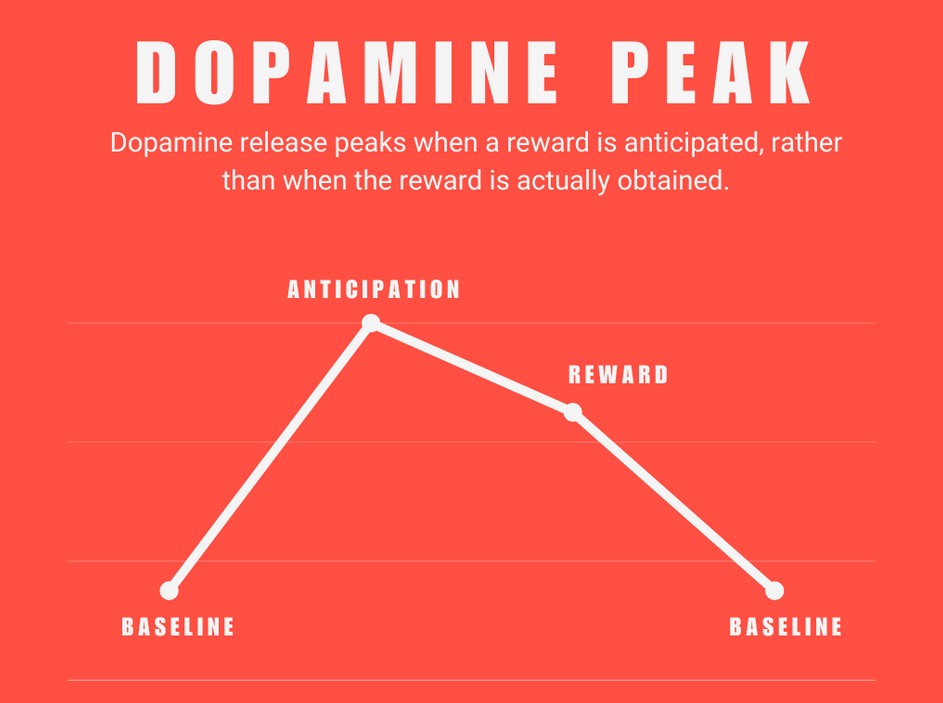
This is the core of what can be called "The Dopamine Delusion".
The Myth of Dopamine as Pleasure
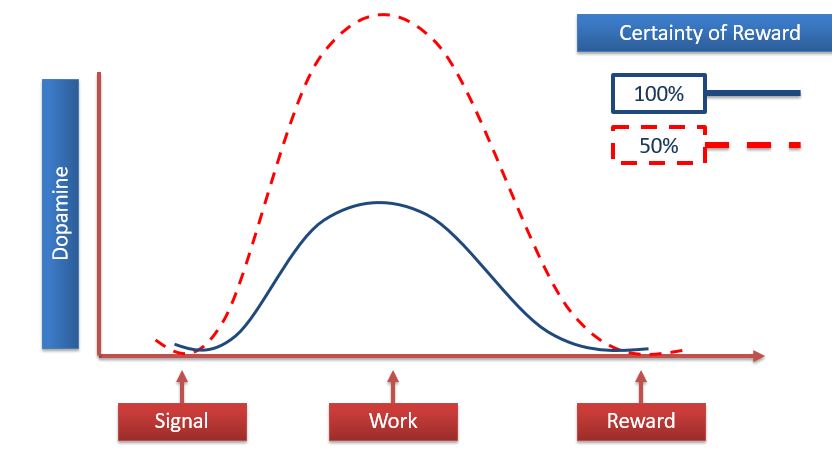
Hardwired For Anticipated Rewards
A large part of the human brain is wired to anticipating and responding to rewards.
This system involves various brain regions, including the prefrontal cortex, the ventral striatum, and the nucleus accumbens.
As a neurotransmitter, dopamine plays a crucial role in this process, being released both when a reward is anticipated and when it is received.
This anticipation of reward can shape our choices and influence our behavior, driving us towards actions that are likely to lead to what we think are more positive outcomes.
Popular science often portrays dopamine as the brain’s pleasure chemical, but this is a misconception.
- Dopamine is more accurately described as the neurotransmitter of anticipation, motivation, and reinforcement learning.
- While pleasure and dopamine are related, they are not synonymous.
- The pleasure you feel during a reward is often separate from the dopamine-driven process that got you there.
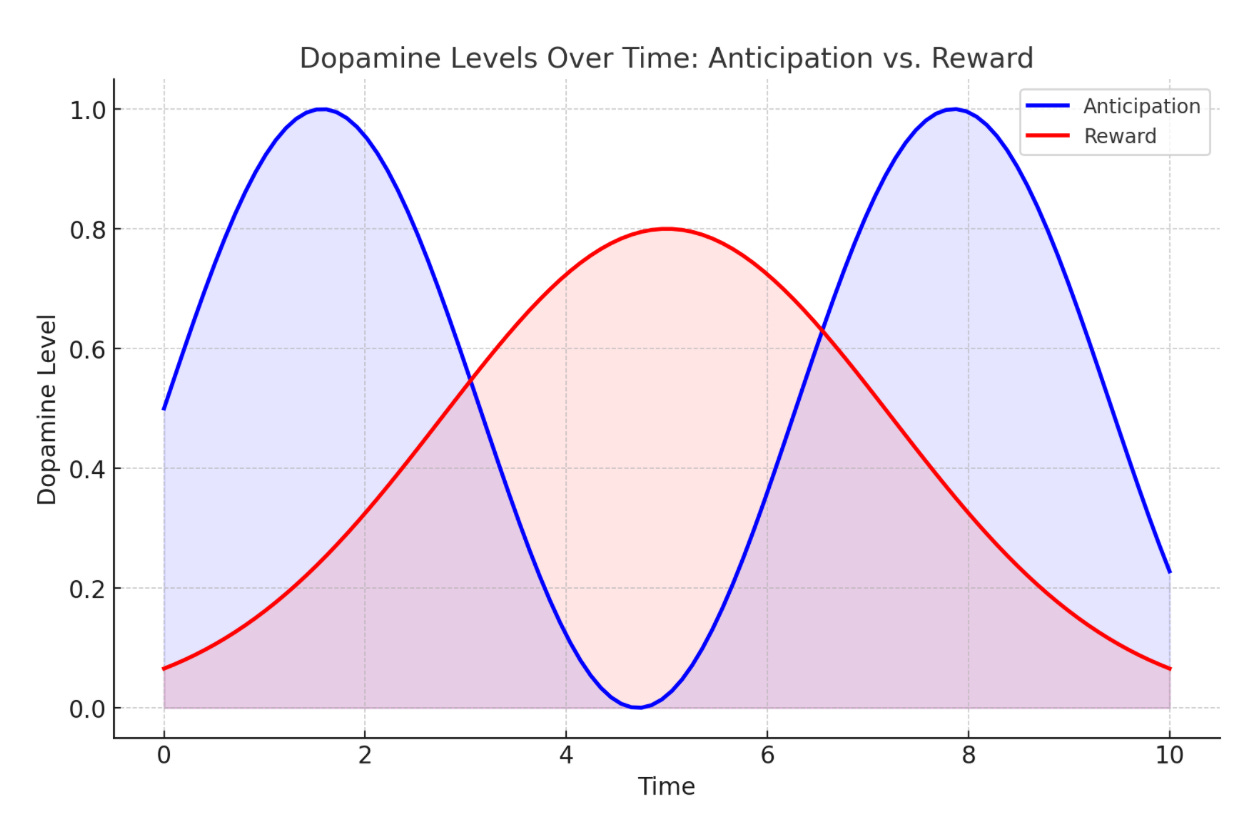
This means that the brain releases the most dopamine before the reward is obtained in the space of longing, hoping, and chasing.
Once the reward arrives, dopamine levels often return to baseline or even dip, especially if the outcome was expected.
The Science Behind the Chase
The most well-established theory explaining this phenomenon is known as Reward Prediction Error (RPE).
This theory suggests that dopamine neurons fire based on the difference between expected and actual outcomes:
- If the reward is better than expected, dopamine spikes.
- If it is exactly as expected, there is little to no dopamine change.
- If it is worse than expected, dopamine activity drops.
This mechanism allows the brain to learn from experience and adjust behavior accordingly.
This means that our strongest neurological "highs" come from surprise or novelty - not from predictable, well-earned success.
The Shift from Reward to Cue
Neuroscientific studies have shown that over time, dopamine responses shift from the reward itself to the cue that predicts the reward.
For example, in early learning stages, an animal may show a dopamine spike when receiving food. But after repeated trials, the spike occurs when a light or sound—predicting the food—appears.
The reward becomes neurologically less exciting than the signal that it is coming.
This helps explain why the build-up to an event - such as planning a vacation, awaiting a package, or anticipating a romantic date - often feels more thrilling than the event itself.
Addiction and the Trap of Anticipation
This dopamine-driven anticipation loop becomes particularly dangerous in the context of addiction.
Drugs, gambling, and even digital behaviors like social media use can hijack the brain’s dopamine system.
In these cases, the craving (anticipation) becomes stronger and more neurologically reinforced than the actual act of using the drug or engaging in the behavior.
People suffering from addiction often report that the urge to use is more intense than the experience of using.
The dopamine system isn’t delivering pleasure per se; it’s screaming, "Do it again!" regardless of whether the outcome is enjoyable or destructive.
A Reward For Achievement - The Role of Serotonin
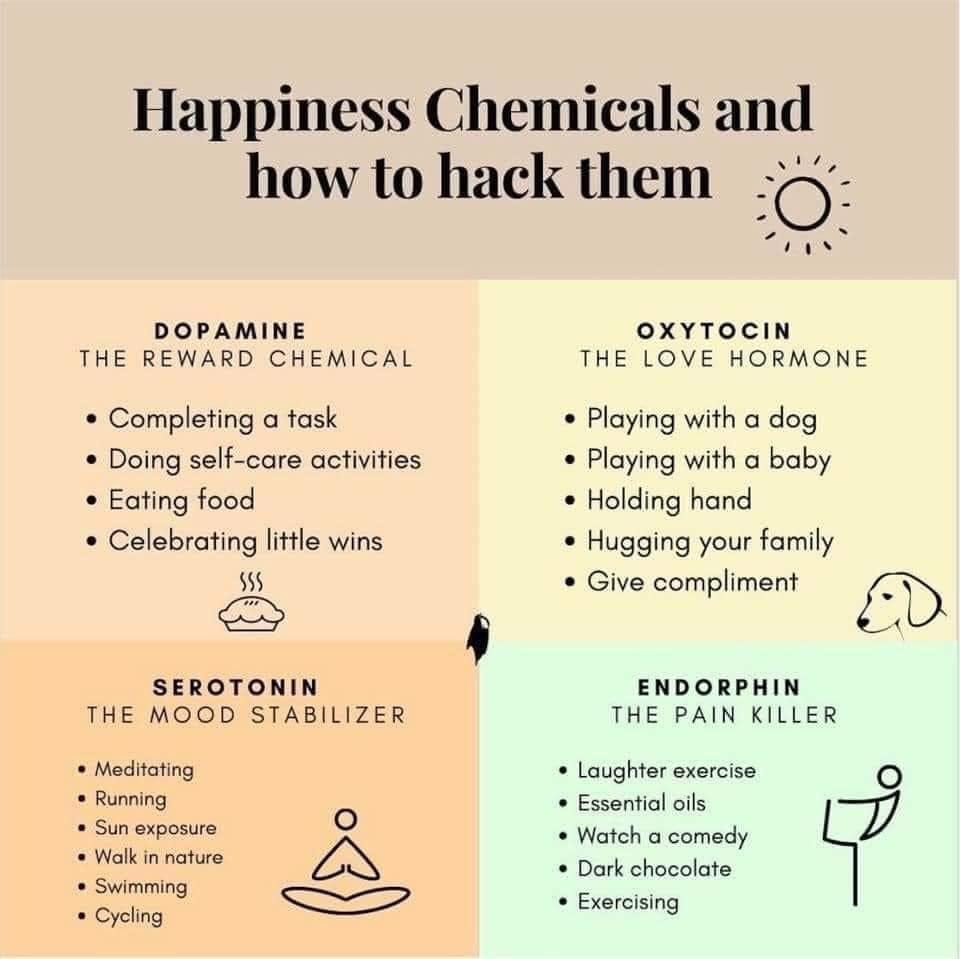
While dopamine fuels our motivation to pursue goals, serotonin plays a different but complementary role in the reward landscape:
- Serotonin is associated with contentment, well-being, and long-term satisfaction.
- Unlike dopamine, which spikes in bursts and quickly fades, serotonin supports a more stable and enduring sense of fulfilment.
- Serotonin levels tend to rise with sustained behaviors linked to social bonding, achievement, and meaning—such as helping others, achieving long-term goals, or spending time in nature.
- Importantly, serotonin can help balance the dopamine-driven urge to chase novelty by anchoring us in the value of what we already have.
The Connection Between Serotonin and Values, Achievement and Lasting Fulfillment

One of the most powerful ways to cultivate serotonin is by pursuing achievements that are deeply aligned with your core values.
When you achieve something that resonates with what truly matters to you - whether it's honesty, compassion, creativity, or contribution - the brain is more likely to reward you with enduring satisfaction.
This is because values-aligned behavior taps into a different kind of reward system - one that transcends fleeting excitement.
How To Break Free From The Dopamine Delusion
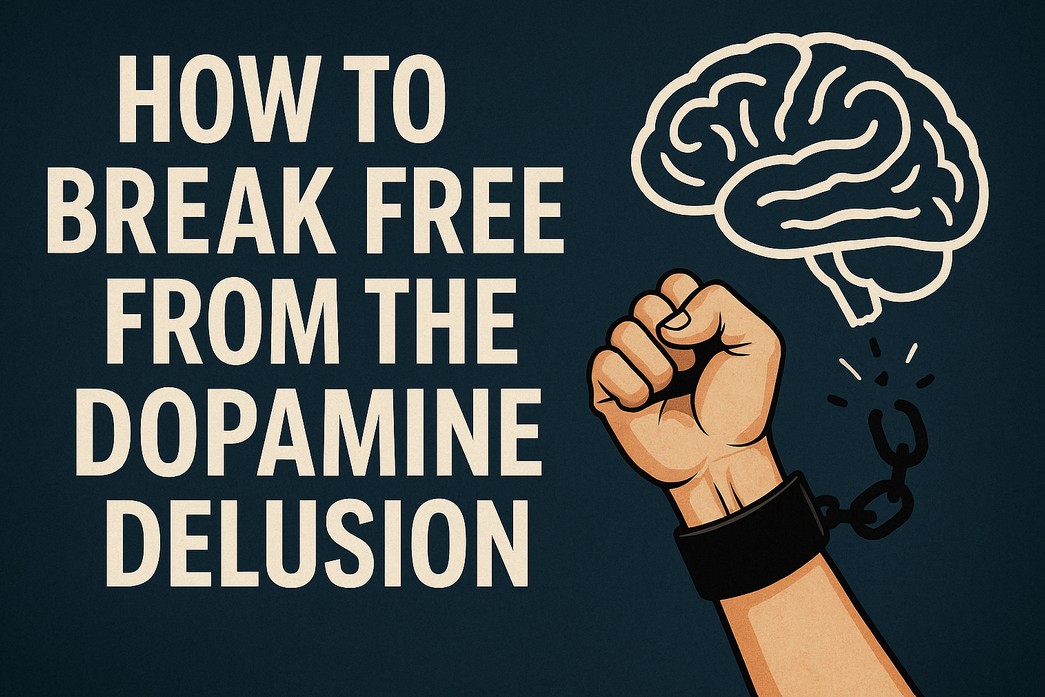
The Existential Implications
From an existential perspective, the dopamine delusion mirrors ancient wisdom:
- Buddhism teaches that desire leads to suffering, as fulfillment never brings lasting satisfaction.
- Christianity suggests that unchecked desires, particularly selfish ones, can lead to suffering because they often seek fulfilment in things that are temporary or ultimately unfulfilling.
- Stoicism cautions against overvaluing external outcomes and emphasizes contentment with the present.
- Mindfulness trains us to notice cravings and thoughts without blindly following them.
Understanding the dopamine system - and serotonin’s role as a stabilizer - allows you to step back from the illusion that the next achievement will complete you.
Looking at the bigger picture, the two fundamental themes of this site are: how to think and how to stop thinking.
In this context, having a high-level understanding of how your brain works and why it works as it does is an important thinking skill.
As with all of the practical resources that I share on this site it does require a certain amount of conscious effort to implement, but the payback is huge.
Underpinning all of this is the pragmatic view that over the long term, the outcomes that you experience in your life are determined by how you respond to the events in your life.
Many of the things that happen in your life are random and beyond your control.
But, the one thing you can control is how you choose to respond to these events - and it is a choice. To paraphrase Victor Frankl:
"Between stimulus and response there is a space. In that space is your power to choose your response. In your response lies your growth and your freedom."
Reclaiming Agency: How to Use This Insight
[1] Working With Dopamine Rather than trying to eliminate dopamine-driven behavior, here are a few ways you can learn to work with it:
[2] Cultivating Serotonin Inducing Practices
Conclusion
- The dopamine delusion occurs because you misunderstand its role.
- Your brain is wired to chase, to anticipate, to strive.
- But real satisfaction rarely comes from the fulfillment of desire.
- It comes from understanding the nature of that desire, and from not confusing excitement with contentment.
- Dopamine fuels the chase, serotonin provides the long term peace and satisfaction.
References
- Anticipation of increasing monetary reward selectively recruits nucleus accumbens. Knutson, B., Adams, C. M., Fong, G. W., & Hommer, D. (2001). Journal of Neuroscience, 21(16), RC159.
- What is the role of dopamine in reward: hedonic impact, reward learning, or incentive salience? Berridge, K. C., & Robinson, T. E. (1998). Brain Research Reviews, 28(3), 309-369.
- Towards a functional neuroanatomy of pleasure and happiness. Kringelbach, M. L., & Berridge, K. C. (2009). Trends in Cognitive Sciences, 13(11), 479-487.
- Serotoninergic regulation of emotional and behavioural control processes. Cools, R., Roberts, A. C., & Robbins, T. W. (2008). Trends in Cognitive Sciences
- Striatal Serotonin Release Signals Reward Value. Mitchell G. Spring and Katherine M. Nautiyal. Journal of Neuroscience 9 October 2024, 44 (41) e0602242024;
Return from: "The Dopamine Delusion" to: Walking The Talk
Next Article:
The Power Of Silence Is Experienced In Your Use Of Language
LATEST ARTICLES
Living in Survival Mode Without Surrendering Mental Authority
Living in Survival Mode Without Surrendering Mental Authority
 Clear Thinking When You’re Just Trying to Stay Afloat. Many people today are overwhelmed because they are living in survival mode - not temporarily, but as a persistent condition of life. For many, th…
Clear Thinking When You’re Just Trying to Stay Afloat. Many people today are overwhelmed because they are living in survival mode - not temporarily, but as a persistent condition of life. For many, th…Manifestation Without Magic: A Practical Model
 Manifestation without magic is not a softer or more intellectual version of popular manifestation culture. It is a different model altogether. Popular manifestation teachings tend to frame reality as…
Manifestation without magic is not a softer or more intellectual version of popular manifestation culture. It is a different model altogether. Popular manifestation teachings tend to frame reality as…Staying Committed When You Can't See Progress - The Psychology of Grit
 Uncertainty Is Not The Absence Of Progress, Only The Absence Of Reassurance. One of the most destabilising experiences in modern life is not failure, but uncertainty and staying committed when you can…
Uncertainty Is Not The Absence Of Progress, Only The Absence Of Reassurance. One of the most destabilising experiences in modern life is not failure, but uncertainty and staying committed when you can…The Battle For Your Mind - How To Win Inner Freedom In A Digital Age Of Distraction
 From External Events to Inner Events. We often think of “events” as things that happen out there: the traffic jam, the rude comment, the delayed email reply. But what truly shapes our experience is wh…
From External Events to Inner Events. We often think of “events” as things that happen out there: the traffic jam, the rude comment, the delayed email reply. But what truly shapes our experience is wh…How to See Your Thoughts Without Becoming the Story
 A Practical Guide to Thought-Awareness. You can spend your life inside the stories of your mind without ever learning how to see your thoughts clearly and objectively. Most of the stuff we tell oursel…
A Practical Guide to Thought-Awareness. You can spend your life inside the stories of your mind without ever learning how to see your thoughts clearly and objectively. Most of the stuff we tell oursel…The Collison Decision Matrix - A Simple Framework for Better Choices
 The Collison Decision Matrix Is A Practical Everyday Thinking Tool. Most of us spend a surprising amount of time worrying about decisions. From small ones such as what to wear, what to eat, what to te…
The Collison Decision Matrix Is A Practical Everyday Thinking Tool. Most of us spend a surprising amount of time worrying about decisions. From small ones such as what to wear, what to eat, what to te…The Power Of Asking The Right Question
 The Power Of Asking The Right Question Lies In The Quest For Insight. To experience the power of asking the right question you must develop the practice of asking questions. The best way to improve th…
The Power Of Asking The Right Question Lies In The Quest For Insight. To experience the power of asking the right question you must develop the practice of asking questions. The best way to improve th…Site Pathways
 Here is a site pathway to help new readers of Zen-Tools navigate the material on this site. Each pathway is based around one of the many key themes covered on this site and contain a 150 word introduc…
Here is a site pathway to help new readers of Zen-Tools navigate the material on this site. Each pathway is based around one of the many key themes covered on this site and contain a 150 word introduc…How To Live With Contradiction - Beyond Thought Let Stillness Speak
 A major impact on so many peoples' lives is the situational contradiction of unfilled realistic expectations. So where does all this leave us? Well here we are, with mental equipment that is more lim…
A major impact on so many peoples' lives is the situational contradiction of unfilled realistic expectations. So where does all this leave us? Well here we are, with mental equipment that is more lim…How To Trust The Process Of Mindfulness - Right Now
 In mindfulness, the process isn’t some distant goal — it's what is happening right now. When we talk about how to trust the process of mindfulness the credibility of the process is heavily dependent…
In mindfulness, the process isn’t some distant goal — it's what is happening right now. When we talk about how to trust the process of mindfulness the credibility of the process is heavily dependent…Inner Mastery For Outer Impact - Mental Clarity For Effective Action
 Insights only matter if they translate into consistent action. In a world crowded with quick fixes and motivational soundbites, the theme “Inner Mastery for Outer Impact” calls us to something more e…
Insights only matter if they translate into consistent action. In a world crowded with quick fixes and motivational soundbites, the theme “Inner Mastery for Outer Impact” calls us to something more e…